The Dill Oil Market is estimated to be valued at USD 793.0 million in 2025 and is projected to reach USD 1196.6 million by 2035, registering a compound annual growth rate (CAGR) of 4.2% over the forecast period.
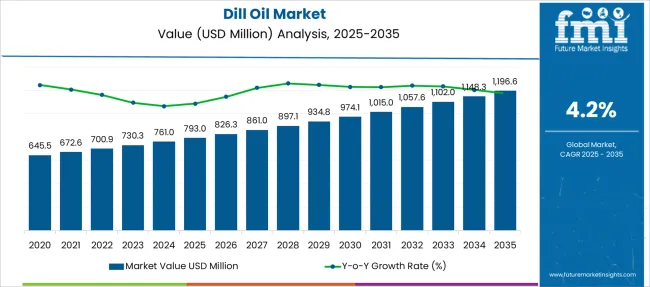
| Metric | Value |
|---|---|
| Dill Oil Market Estimated Value in (2025 E) | USD 793.0 million |
| Dill Oil Market Forecast Value in (2035 F) | USD 1196.6 million |
| Forecast CAGR (2025 to 2035) | 4.2% |
The dill oil market is experiencing stable growth due to increasing demand from food, beverage, pharmaceutical, and personal care industries. The shift toward natural flavoring agents and clean label ingredients has positioned dill oil as a valuable botanical extract in functional product formulations.
Rising awareness about digestive, antimicrobial, and therapeutic benefits of dill oil is influencing both direct consumption and industrial use across health-conscious demographics. Additionally, dill oil’s compatibility with organic farming and herbal medicine practices is expanding its adoption in wellness applications.
With manufacturers integrating advanced cold-press extraction and purity control techniques, the consistency and quality of dill oil have improved, aiding regulatory acceptance across geographies. The market is further supported by a steady rise in essential oil exports and consumer preference for minimally processed ingredients in everyday formulations.
The market is segmented by Type and Application and region. By Type, the market is divided into Dill Seed Oil Type and Dill Weed Oil Type. In terms of Application, the market is classified into Food and Beverages, Spa, Medical, and Personal Care. Regionally, the market is classified into North America, Latin America, Western Europe, Eastern Europe, Balkan & Baltic Countries, Russia & Belarus, Central Asia, East Asia, South Asia & Pacific, and the Middle East & Africa.
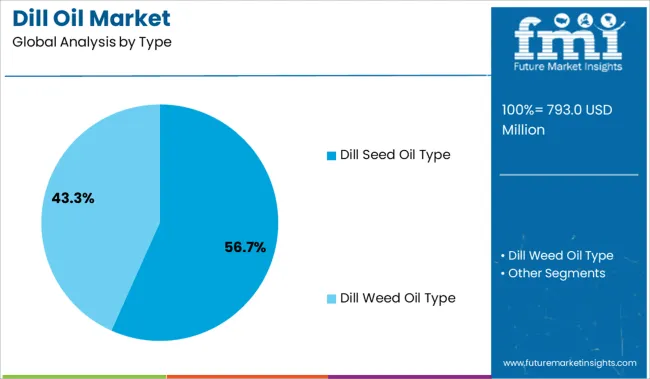
Dill seed oil is projected to dominate the market with a 56.7% revenue share in 2025, making it the leading type segment. This leadership is being attributed to its concentrated composition of carvone and limonene, compounds known for digestive and anti-inflammatory properties.
Dill seed oil has gained preference over weed-based variants due to its stronger aroma, longer shelf life, and enhanced efficacy in flavoring and medicinal formulations. Its consistent application in traditional remedies and increasing incorporation in aromatherapy and pharmaceutical products have reinforced its commercial appeal.
The segment’s growth is further supported by growing demand in dietary supplements and export-ready essential oil blends, particularly in North America and Europe. Additionally, its suitability for steam distillation processes enables scalable production with minimal quality degradation, reinforcing its supply chain viability.
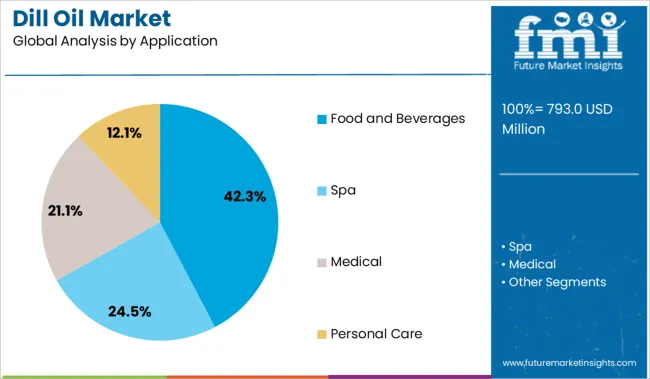
Food and beverages are anticipated to account for 42.3% of the total market revenue by 2025, establishing this segment as the largest application area. The growth of this segment is being driven by the rising demand for plant-based, preservative-free flavoring agents in sauces, seasonings, snacks, and health drinks.
Dill oil’s natural antimicrobial properties and compatibility with vegetarian and clean-label formulations have encouraged its adoption by processed food and nutraceutical manufacturers. Regulatory approvals for food-grade essential oils have further legitimized its use in mainstream edible applications, supporting higher consumption in bakery and dairy products.
Growing interest in ethnic and herbal cuisine has also contributed to wider culinary use of dill oil. With consumer preference shifting toward naturally derived taste enhancers, the food and beverage sector is set to retain its lead in application volume and revenue contribution.
The Global Market for Dill Oil increased from USD 645.5 Million to USD 675.2 Million between 2020 and 2024 with a CAGR of 3.8%
Increasing consumer demand for unique aromatic flavors and fragrances in perfumes, cosmetics, and other relaxation and spa applications is anticipated to increase demand for Dill Oil in cosmetics and personal care products in the coming years. In addition, the expanding disposable income of the middle-class populations in developing countries is fuelling demand for Dill Oil for personal care products and cosmetics.
During the forecast period, the global Dill Oil Market is anticipated to grow from USD 793 Million in 2025 to USD 1,057.6 Million by 2035 with a healthy CAGR of 4.2%.
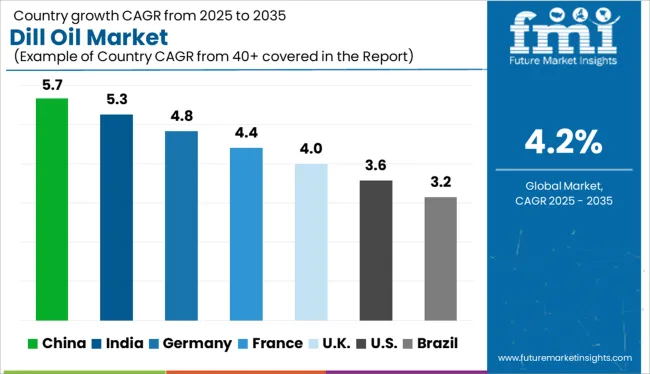
The Asia Pacific region is the leading performer in the Dill Oil market. Dill Oil is used extensively in the food industry, and its demand has been growing steadily over the past few years.
The region has been benefiting from strong economic growth and rising disposable incomes. This has resulted in increased demand for Dill Oil products from the region. Additionally, the region has been witnessing a rise in the health consciousness among consumers, which has further boosted the demand for Dill Oil Products
The Asia Pacific region is anticipated to continue to lead the way in Dill Oil production and consumption in the coming years. China is anticipated to grow at a CAGR of 6.2% during the forecast period.
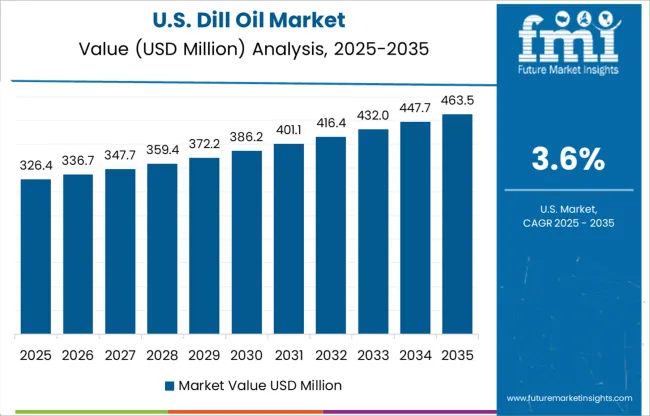
The USA Dill Oil market is constantly shaping and evolving. The USA is the largest market for Dill Oil, accounting for 34.4% of the global market share in 2025.
In the USA, Dill Oil is used as a flavoring agent in many different foods. It is also used in some medical applications. The Dill Oil market is growing in the USA due to the increased demand for these products. The market is currently being shaped by a number of factors, including an increasing demand for Dill Oil, new extraction methods, and changing consumer preferences.
For example, there is a growing preference for organic and natural products. This trend is driving producers to change their practices in order to meet these demands.
Australia is one of the key players in the global Dill Oil Market. The country has a prominent position in the market, owing to its high production and export of Dill Oil. Australia's dill industry is largely concentrated in the states of Victoria and Western Australia. The majority of the country's dill crop is grown in these two regions, which boast ideal growing conditions for the herb.
Australian Dill Oil is known for its high quality and purity. The oil is used in a variety of products, including food seasonings, cosmetics, and fragrances. Sydney Essential Oil is the market leader in Dill Oil in Australia. Australia accounted for 2.4% of the global Dill Oil market in 2025.
It is no secret that the Dill Oil market in India has been booming in recent years. This is due to a number of factors, including the ever-growing popularity of Indian cuisine, the increasing number of health-conscious consumers, and the availability of high-quality Dill Oil products.
Despite the favorable conditions, there are still some challenges that need to be addressed. For one, not all regions in India have access to Dill Oil products. This is primarily due to the fact that dill is not a native plant to India and therefore, its cultivation is limited to certain areas. Additionally, there is a lack of awareness about Dill Oil and its benefits among consumers in India.
According to our research, India is expected to grow at a CAGR of 5.7% during the forecast period.
Dill Oil is often used in the treatment of digestive problems such as indigestion, loss of appetite, and constipation. The calming relief of Dill Oil helps in reducing anxiety and relieving depression and anxiety. Dill Oil is also used to heal injuries and protect them from bacterial infections.
Dill Oil increases sweat levels, which gives the feeling of lightness. It helps the body get rid of excess water, salts, and toxins, thereby reducing blood pressure, decreasing swelling, and protecting the overall health of the skin.
Dill Weed Oil and dill seed oil are two oils that are derived from the dill plant. Both of these oils have a number of benefits that make them popular in the culinary world.
Dill Weed oil is an excellent source of antioxidants, which can help to protect the body against free radicals. This oil also has anti-inflammatory properties, which can be beneficial for those who suffer from conditions like arthritis. Additionally, dill Weed Oil can help to improve digestion and can even be used as a natural insecticide.
Dill Seed Oil, on the other hand, is rich in vitamins and minerals like magnesium, potassium, and calcium. This Oil can help to boost the immune system and can also aid in weight loss.
Dill Oil is a personal care product that can be used to improve the appearance of skin and hair. Dill Oil is rich in vitamins and minerals, which can help to nourish the skin and hair. Dill Oil can also be used to help relieve stress and tension. Dill Oil also has antiseptic and antibacterial properties, making it ideal for use in facial cleansers and toners.
In addition to its pleasant scent and cleansing properties, Dill Oil is also known for its ability to soothe the skin. It can be used to treat rashes, eczema, and other skin conditions.
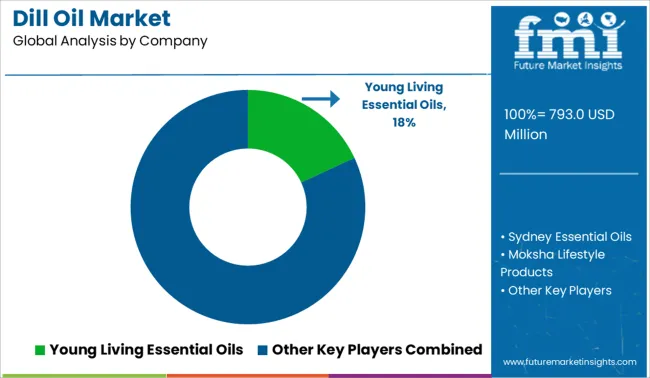
There are a number of companies vying for market share in this growing industry. Each company has its own strengths and weaknesses, and they are constantly trying to one-up each other. It is important for consumers to be aware of the different options available to them when choosing a dill oil supplier.
The thorough evaluation of the report provides the growth potential, upcoming trends, and statistics of the Dill Oil Market size and what it predicts for the future. The report also analyses the market trend drivers and challenges and the competitive evaluation of the existing market.
| Attribute | Details |
|---|---|
| Forecast Period | 2025 to 2035 |
| Historical Data Available for | 2020 to 2025 |
| Market Analysis | USD Million for Value and Units for Volume |
| Key Regions Covered |
Europe; Asia Pacific; North America; Latin America; Middle East and Africa |
| Key Countries Covered |
India, USA, Germany, China, Japan, Denmark, Canada, Mexico, United Kingdom, France, Italy, Spain, South Korea, Australia, Brazil, Argentina, South Africa, United Arab Emirates |
| Key Segments Covered |
Type, Application, Region |
| Key Companies Profiled |
Sydney Essential Oils; Moksha Lifestyle Products; Essential Oils of New Zealand; Ungerer Limited; Young Living Essential Oils; Mountain Rose Herbs; dTERRA |
| Report Coverage | Drivers, Restraints, Opportunities and Threats Analysis, Market Forecast, Company Share Analysis, Market Dynamics and Challenges, Competitive Landscape, and Strategic Growth Initiatives |
| Customization & Pricing | Available upon Request |
The global dill oil market is estimated to be valued at USD 793.0 million in 2025.
The market size for the dill oil market is projected to reach USD 1,196.6 million by 2035.
The dill oil market is expected to grow at a 4.2% CAGR between 2025 and 2035.
The key product types in dill oil market are dill seed oil type and dill weed oil type.
In terms of application, food and beverages segment to command 42.3% share in the dill oil market in 2025.






Full Research Suite comprises of:
Market outlook & trends analysis
Interviews & case studies
Strategic recommendations
Vendor profiles & capabilities analysis
5-year forecasts
8 regions and 60+ country-level data splits
Market segment data splits
12 months of continuous data updates
DELIVERED AS:
PDF EXCEL ONLINE
Dill Pickles Market Size and Share Forecast Outlook 2025 to 2035
Dill Juice Market Analysis by Application and Distribution Through 2035
Oily Waste Can Market Size and Share Forecast Outlook 2025 to 2035
Oil and Gas Seal Market Size and Share Forecast Outlook 2025 to 2035
Oil Coalescing Filter Market Size and Share Forecast Outlook 2025 to 2035
Oil-immersed Iron Core Series Reactor Market Size and Share Forecast Outlook 2025 to 2035
Oil and Gas Sensor Market Forecast Outlook 2025 to 2035
Oil Packing Machine Market Forecast and Outlook 2025 to 2035
Oil and Gas Pipeline Coating Market Forecast and Outlook 2025 to 2035
Oilfield Scale Inhibitor Market Size and Share Forecast Outlook 2025 to 2035
Oil-in-Water Anionic Emulsifier Market Size and Share Forecast Outlook 2025 to 2035
Oil and Gas Field Services Market Size and Share Forecast Outlook 2025 to 2035
Oil Control Shampoo Market Size and Share Forecast Outlook 2025 to 2035
Oil Expellers Market Size and Share Forecast Outlook 2025 to 2035
Oilfield Stimulation Chemicals Market Size and Share Forecast Outlook 2025 to 2035
Oiler Kits Market Size and Share Forecast Outlook 2025 to 2035
Oil Pressure Sensor Market Size and Share Forecast Outlook 2025 to 2035
Oil Filled Power Transformer Market Size and Share Forecast Outlook 2025 to 2035
Oily Skin Control Products Market Analysis - Size and Share Forecast Outlook 2025 to 2035
Oil Immersed Shunt Reactor Market Size and Share Forecast Outlook 2025 to 2035

Thank you!
You will receive an email from our Business Development Manager. Please be sure to check your SPAM/JUNK folder too.
Chat With
MaRIA